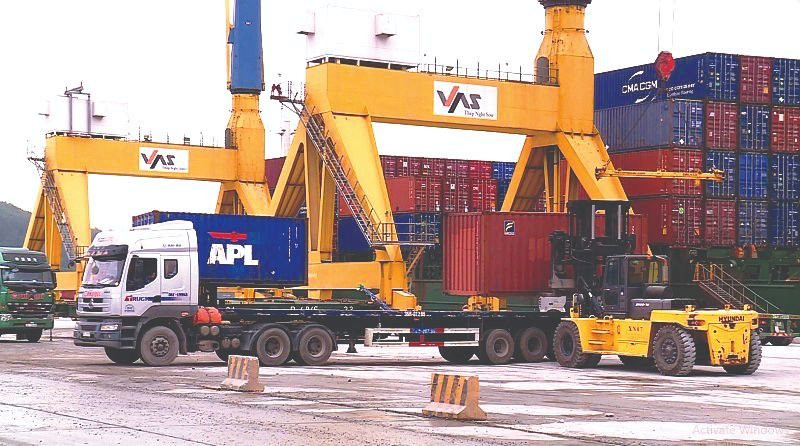There could be many survey (inspection) reports for a shipment, but it was important to note the content, time, and place of issuing them because their legal values were different through the dispute below for your reference.
Summary of Facts: On 11/04/2013, Respondent (insurer) signed a Cargo Insurance Principle Contract (“Contract”), accepting insurance under ICC “A”, General Rules for Cargo Insurance transportation by sea (“General Rules”) for a shipment of imported steel by sea to a warehouse in Vietnam (“Warehouse”). Under the Contract, the Respondent issued an Insurance Policy for 600 mt (+/- 10%) of rolled steel from a Chinese port to a Warehouse at Long An with the insurance amount of 110% CIF of USD 484,856.83 (VND 10,254,722,000). Then, the Respondent issued a Certificate of Amendment and Supplement, adding the name of the vessel (“Vessel”), departing from Shanghai port on 24/2/2014, bill of lading number, and the revised insurance amount of VND 10,268,582,000.

On 06/03/2014 Vessel berthed at Lotus Port, HCMC. Before unloading, Claimant discovered that the shipment was damaged and immediately notified and appointed an inspection company to conduct a survey at the cargo hold (“Survey 01”) and agreed to transfer the shipment to Claimant’s warehouse at Long An for further survey. On 08/03/ 2014, Lotus Port made a Cargo Outturn Report confirming that some goods were broken or damaged before unloading: “almost all of the surface of the steel coils of this shipment was wet with sweat, 43 rolls with outer splint broken and the packaging were torn, 01 roll had curled edges”. The Claimant, basing on the Survey 01, determined that the quantity of damaged goods was 546.12 mt, the amount was VND 3,979,491,963, and advised to remove the damaged partso as to limit the loss, and sold 63.09 mt to some customers; 535.61 mt were pending.
On 25/06/ 2014, although the Survey Report issued on May 22, 2014 had not been provided - this report only stated the cause of the loss (“Survey 02”) - the Respondent said the above loss did not occur during transportation but already existed before loading the goods onto the Vessel, so there was no liability for compensation. Claimant did not accept and notified to limit loss, would sell goods to recover remaining value. On 06/11/2014, Respondent sent a letter stating: “The damaged goods were kept for a long time, the condition of goods was different from the time of discovery of the loss, the damage assessment of the goods at the present time would not accurately reflect the extent of cargo loss during the period of insurance. Therefore, [Defendant] did not accept the assessment results according to the notice of [Claimant] dated 03/11/2014”.
.jpg)
On 02/02/2015 Claimant filed a lawsuit requesting Respondent to: (i) compensate 60% of the market price of the above shipment at the time of loss, equivalent to VND 5,500,000,000; (ii) pay interest due to late compensation; (iii) bear the cost of determining the market price and extent of damage to the shipment; (iv) pay the arbitration fee. At the Hearing, Claimant added: (iv) Compensation amount of VND 5,560,000,000, (ii) interest on late payment of VND 444,000,000 and (v) survey fee of VND 66,000,000.
Claimant’s point of view: There were no exclusions to deny compensation; it had been more than 170 days since the end of the survey but the Respondent had no opinion on handling and limiting the loss, therefore, within 10 days from the date of the document (30/9/2014), if no response, Claimant would handle the damaged goods in the following way: (a) to request an independent surveyor to re-determine the quantity and value of the loss; (b) to open a public auction and presume that the Respondent had accepted the compensation in accordance with the foregoing treatment without any claim. Survey 02 did not mention the extent of the damage, so, upon receipt, Claimant “asked another independent inspection company to re-examine the above damaged shipment” but Respondent did not respond.
Respondent’s point of view: (i) the shipment was defective or inherently defective, combined with sweating/steaming during transportation, so it was blackened/ yellowed on the surface; the possibility of blackening/yellowing before loading could not be excluded because of the short transportation time; (ii) about the phenomenon of concave goods, surface defects, there was no evidence to say that this phenomenon occurred during transportation; this shipment was defective, not quality guaranteed right from the production stage; (iii) based on the Survey 01 as well as other factors, the loss of goods did not occur during transportation but occurred before loading the goods on board the Vessel, so it was not responsible for compensation.
(*) VIAC Arbitrator